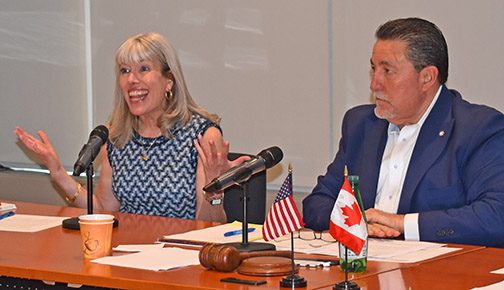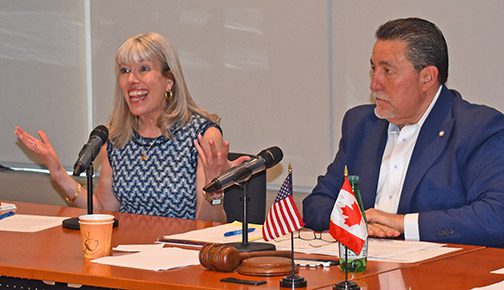The following news item was shared by the Seafarers International Union on May 8, 2025.
The head of the nation’s leading domestic maritime coalition sees great opportunities for the industry – and is committed to helping capitalize on them.
Jennifer Carpenter serves as both the newest president of the SIU-affiliated American Maritime Partnership (AMP), as well as president and CEO of the American Waterways Operators. She addressed the Maritime Trades Department’s Executive Board meeting May 7 at AFL-CIO headquarters in Washington, D.C.

AMP President Jennifer Carpenter (left), MTD/SIU President David Heindel (Credit: SIU).
Speaking immediately after AFL-CIO President Liz Shuler, Carpenter noted, “Labor was absolutely essential to the formation of AMP way back in 1995 when it went by the inelegant name Maritime Cabotage Task Force. We decided we needed to work on the nomenclature a little bit, but the purpose has been consistent for the last 30 years, and that is single-issue focused on defending the Jones Act, the law that really is the statutory foundation of the domestic maritime industry.”
The Jones Act has protected U.S. national, economic and homeland security for more than a century. The law requires that cargo moving between two points in the U.S. is carried aboard vessels that are crewed, built, flagged and owned American.
“The case for the Jones Act has never been stronger or more relevant to issues that Americans care about,” Carpenter stated. “Everybody is focused on working-class American jobs, and that is the Jones Act through and through. We’re talking 650,000 American jobs, direct and indirect, that rely on this industry….”
She pointed out that the general public gained a new appreciation for the maritime industry during the COVID 19 pandemic, when people “realized that empty shelves are a thing that can happen. Supply chains don’t just work miraculously; they work because people make them work.”
The domestic maritime industry shined during that period, particularly compared to the “wild swings in international commerce” that took place, Carpenter recalled. “We didn’t see that domestically, because we had American control of our supply chain,” she said. “We had American workers, American owners committed to this trade. I think that that resonates with people in a way that it didn’t five or six years ago.”
Carpenter then focused on a sometimes-underappreciated aspect of the nation’s freight cabotage law.
“Somebody asked me not long ago, what does America without the Jones Act look like? And I said, borderless. Our coastline is our longest border, and the Jones Act is absolutely essential to maritime border security. We know that it is a very dangerous world. Maritime is a critical domain in which geopolitical tensions are being played out, whether we’re talking about the Middle East, whether we’re talking about the Taiwan Strait, whether we’re talking about Russia and Ukraine. So, I think that there is a relevance to our arguments that was always there, but that maybe folks didn’t recognize in the same way that they do now.”
Turning her attention to politics, Carpenter said, “I think there is an emerging bipartisan consensus that growing our maritime industry is essential to economic and homeland and national security. In just the last two months, we’ve seen the president’s executive order on restoring American maritime dominance. We’ve seen the reintroduction of the SHIPS for America Act by that wonderful bipartisan coalition of Senator (Mark) Kelly, Senator (Todd) Young, Congressman (Trent) Kelly and Congressman (John) Garamendi. These two important initiatives are focused primarily on growing the U.S.-flag international fleet. That is absolutely essential, because that’s where we’ve got quite a bit of catching up to do, but I think it’s significant that they take the Jones Act as a foundation.”
Carpenter noted that it remains critical for industry representatives to promote American maritime. In particular, and notwithstanding the current strong bipartisan backing, she noted that there are dozens and dozens of new members of Congress along with new staffs on Capitol Hill.
“Let’s get out there and let’s educate them,” she said. “Let’s not assume that they understand what the Jones Act is. Let’s not assume that if they think they know what the Jones Act is, they’re right about what the Jones Act is.”
She concluded, “The Jones Act is critical to a strong American workforce, economy, supply chain, and border security. Now more than ever, we need to amplify the voice of all workers in support of the Jones Act.”



Comments are closed.